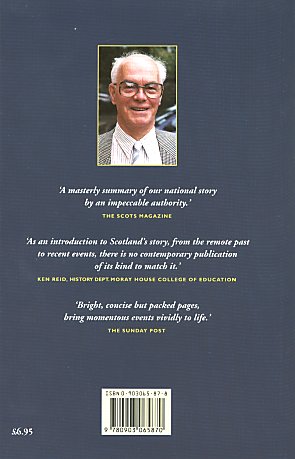 Foreword Foreword
Not so many years ago it was commonly
argued that Scots could not really learn about their history because
'there are no books'. It was an absurdly untrue statement even then, and
it is certainly untrue now. General histories, in single volumes or in
multi-volume series, of scholarly quality, are now readily available and
widely-studied. Studies of particular themes and topics, and edited
collections of documents, are becoming available in such variety as to
encourage the serious study of virtually all aspects of our history; and
the Scottish universities have been fortunate in recent years to have
the services of distinguished and influential historians working in the
field of Scottish history, once the poor stepbairn of History
departments.
These scholarly activities have
stimulated many humbler works whose aim is to bring some knowledge of
Scottish history to pupils and students at school or college, and to
such members - and there are many - of the general public, who are
awakening to an interest in Scotland's story.
Why then this book? It does not, and
cannot, offer an exhaustive coverage of Scotland's history, nor would I
have the impertinence to attempt such a task. I have tried to offer, to
the general reader, not another narrative, but rather an explanation. I
have concentrated upon what I believe to be the factors and the
influences, the events and developments, the opinions and the decisions,
which have caused Scots to undergo that set of experiences which we call
our history.
James Halliday.
The Author
James Halliday was born in
Wemyss Bay in 1927. After attending the village school at Skelmorlie and
Greenock High School, he graduated in history at Glasgow University, being
awarded the Medley and Lanfine Prizes during his course.
He taught in Further Education
at Ardeer and in High Schools in Coatbridge and Uddingston, before going
to Dunfermline High School in 1958. There he was appointed Principal
Teacher of History, leaving in 1967 to join the History Department of
Dundee College of Education. In 1979 he became head of that department
until retiring in 1988.
He was awarded the M. Litt.
degree from Glasgow University in 1963 for his study of the issues and
personalities of the Revolution in Scotland during the years 1688-90. He
has served at various times on the council of the Scottish History
Society, the Scottish Records Association and the Scottish Association of
Teachers of History, and has written extensively on history and the
teaching of the subject. |

